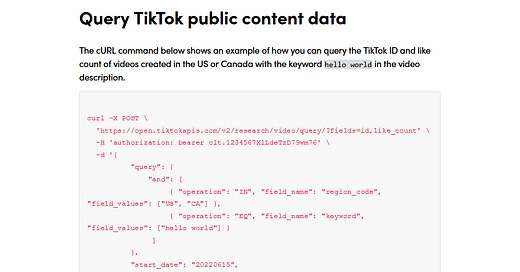Should researchers use the TikTok API?
Plus, two papers on visual misinformation we’re reading and plenty of events to put on your calendar.
When multiple people converge on the same idea independently, it’s often a sign that they’ve landed on something important. This week, we read two new papers (neither from within CITAP) that both call for further study of visual misinformation. In the Journal of Communication, Yunkang Yang, Trevor Davis, and Matthew Hindman review the images used in political communications on Facebook. They found:
Over and over, we encountered high-engagement image posts that directed hate toward nondominant social groups such as women and racial minorities. Democratic female public figures—especially those of color—seem particularly likely to be targeted for abuse.
Identity propaganda is overwhelmingly prevalent in these images, they note.
And in Political Communication, Yilang Peng, Yingdan Lu, and Cuihua Shen consider how to research visual forms of misinformation:
[W]e identify a theoretical framework that explains the persuasive mechanisms and pathways of visual features in lending credibility (e.g., as arguments, heuristics, and attention determinants). We propose a list of relevant visual attributes to credibility perceptions and a research agenda that integrates methods including computational visual analysis, crowdsourced annotations, and experiments to advance our understanding of visual misinformation.
There’s clearly a great deal of non-text-based research ahead.
About that new TikTok API
TikTok released a research API, and social media researchers everywhere are digging into the terms of service and hashing out how to put it to use. Tech Policy Press is hosting some excellent advice from across the research community.
Affiliate Joe Bak-Coleman considers the worst-case scenario and concludes: ““All API ToS’s are violated at times, but the conditions TikTok has created seem distinct in that there appears to be no plausible pathway to published research without violating the ToS.”
Megan Brown from NYU’s Center for Social Media and Politics points out the similarities between TikTok’s terms and other platforms’, concluding that “[t]o perform public-interest research investigating social media — including on vital questions around democracy, public health, crisis informatics, and more — researchers should not have to rely on the good will of platforms to provide data access. And platforms should not get to decide what data is available to researchers, which researchers get access to data, and what restrictions on collection, analysis, and publication are put in place.”
Publications and appearances
Deen Freelon co-authored a new methods piece on Digital Trace Data for Social Media Effects Research: “Most users leave traces in digital spaces (e.g., cookies in a browser, log data on social media platforms), and, for many, daily usage routines form a sequence of continuous interactions with digital platforms… In short, digital trace data from users are unobtrusively and continuously collected by digital platforms and are thus non-reactive (but potentially reflexive, e.g., being impacted by algorithmic processes, observer effects, or amplification via social indicators.”
Affiliate Felix Simon co-authored “Climate Journalism that Works,” a new report from the European Broadcasting Union on understanding obstacles to publishing effective climate reporting and resources for newsrooms looking to change their practices.
Coming soon
March 8, 6:30pm: Tressie McMillan Cottom will moderate a virtual panel for the Brooklyn Public Library featuring Barbara Brandon-Croft, Patricia J. Williams, and Sara K. Gould on Women & Justice. Register to join.
March 23, 7pm: Tressie McMillan Cottom will give the Robert Smalls Lecture on “Troubling the Public During Troubling Times” at the University of South Carolina.


March 29: Tressie McMillan Cottom will give a talk at the UMass-Amherst College of Education. Details to follow.
March 30, 4pm: Tressie McMillan Cottom will give the Kim and Judy Davis Lecture at the Harvard Radcliffe Institute. Register for in person or online attendance.
March 31, 11am: The CITAP spring speaker series presents Hakeem Jefferson, “From Margin to Center”: Reorienting our Approach to the Study of Race and Inequality in the Social Sciences. Details and registration.
April 10, 9am: CITAP affiliate Bridget Barrett will give a public dissertation defense of her work on political merchandizing by campaigns and unofficial sellers. Details and registration (both in-person and virtual) to follow.
April 20, 3pm: CITAP presents a talk from affiliate Melanie Feinberg about her book Everyday Adventures with Unruly Data.
May 2-3: Join us at “Social Justice and Technological Futures,” hosted by the University of Tübingen. Registration is free.
May 30: Release date for Alice Marwick’s The Private Is Political: Networked Privacy and Social Media.







